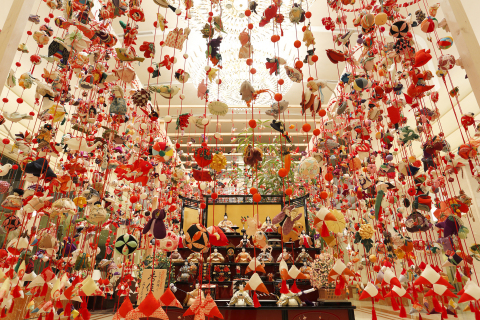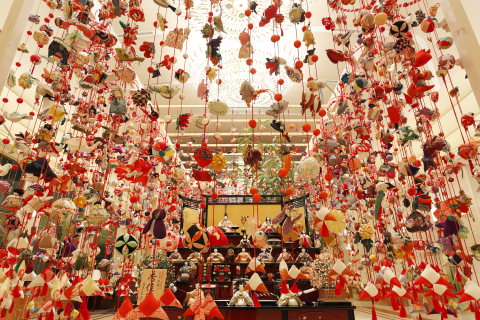TOKYO--(BUSINESS WIRE)--Keio Plaza Hotel Tokyo, one of Japan’s most prestigious international hotels located in Shinjuku, Tokyo, will host a special exhibition of traditional Japanese arts to celebrate traditional Hinamatsuri girls’ doll festival by displaying various traditional art ornaments in the hotel from February to March, 2017. This annually held exhibition has been extremely well received by guests, and this year features some 6,500 finely hand woven silk doll decorations, Japanese art ukiyoe items depicting scenes of “Japanese female culture”, and “Bonsai” miniature decorative sculptured plants to give visitors a taste of Japan’s traditional arts representative of the “Hinamatsuri Girls’ Doll Festival”.
The hanging decorative art ornaments are specially hand stitched expressly for the hotel exhibition using finely woven silk cloth from old kimonos. Each of the handiworks has been carefully created for this exhibition and symbolically reflects the hopes for the health and happiness of children. The central set of dolls represents figures from the Japanese court of the Heian period (794-1185). Our guests from around the world are awestruck by the grandeur of this exhibit, which offers the perfect opportunity for guests to take pictures as memories of this exhibition.
The tradition of “bonsai” miniature decorative sculptured plants, which has been a traditional part of Japanese culture, will be highlighted in this year’s exhibition. The art of “bonsai” is said to have started during the Heian Period and became a popular traditional part of “Japanese female culture” from the Meiji Period. Through to the Meiji era, Japanese women were introduced to bonsai as part of their learning on refinement and etiquette, which was said to help instill a sense of beauty in their souls. Masterpieces from The Omiya Bonsai Art Museum in Saitama will be on display, as well as a collection of bonsai-related artifacts and woodblock ukiyoe prints, to show how bonsai played a role in the lives of Japanese women in the past.
In recent years, the term “bonsai” has become recognized throughout the world in reflection of the growing global appreciation for this traditional Japanese art. Through this exhibition, we seek to offer our guests unique opportunities to discover new and deep aspects of Japanese traditional culture.




